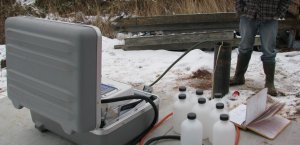
Groundwater Quality

Groundwater quality is influenced by the type of geologic materials and contact time with these materials in the groundwater flow system.
Groundwater Quality in Nova Scotia
Groundwater quality in Nova Scotia is generally good, and in most areas of the province a properly constructed and maintained well can provide a source of clean, safe drinking water. Groundwater quality, however, is influenced by the type of geologic materials in contact with groundwater, and several types of naturally-occurring water quality problems can occur, which is why it is important to regularly test your well water.
Naturally-occurring water quality problems in Nova Scotia include arsenic, chloride, fluoride, hardness, iron, manganese, sulphate and uranium. A summary of the province’s activities related to arsenic, uranium and manganese in well water have been published, and risk areas for naturally occurring arsenic, uranium and manganese have been mapped across the province. Chloride can also pose a problem in wells located close to the ocean due to the movement of seawater into coastal aquifers. To find out more about seawater intrusion vulnerability click here. Corrosive groundwater is associated with an elevated risk of metals, such as lead and copper, leaching from well or plumbing material. To find out more information about the potential corrosivity of groundwater in your area, click here.
The Geological Survey Division collects and publishes groundwater quality information from various sources. Groundwater quality information can be found on the Nova Scotia Groundwater Atlas and the Groundwater Chemistry Map Series. Groundwater quality information, summarized by groundwater region, can also be found here.
For more information on drinking water quality and treatment visit Nova Scotia Environment and Climate Change.

